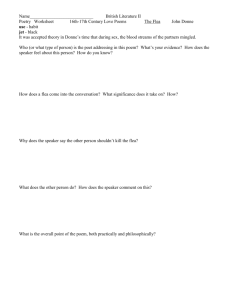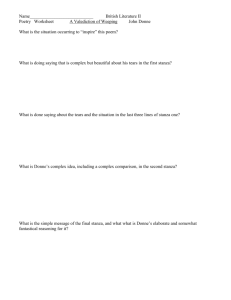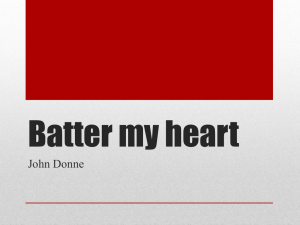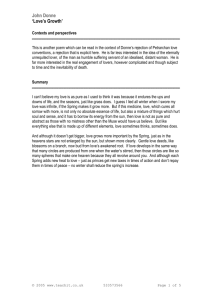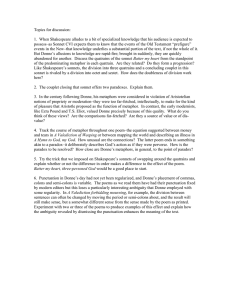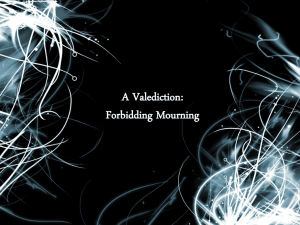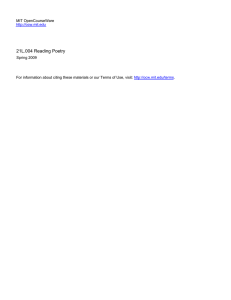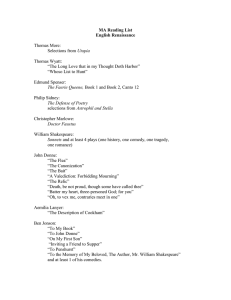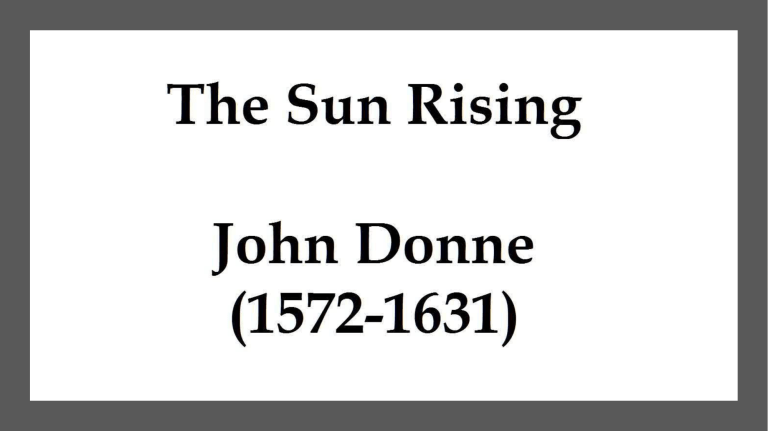
Background - John Donne • • • • John Donne – pronounced "Dunn" He was born in London 1572 and died in 1631. His father had bequeathed him a sizable wealth. In 1617, while giving birth to their twelfth child, Anne Donne died. From then on, the poet's life would take on a sickening hue, and he died in 1631. • The English poet wrote the sonnet "The Sun Rising." Throughout his life, Donne authored a wide spectrum of social satire, sermons, holy sonnets, elegies, and love poems, and he is arguably most recognized for the parallels between his sensual poetry and his religious poetry. • Much of his writing, including "The Sun Rising," was published after his death in the collection Songs and Sonnets, published in 1633. In "The Sun Rising," the speaker urges the sun to warm his bed so that he and his beloved may spend the entire day in bed rather of waking up to go to work. • The poem's whimsical use of language and extended metaphor exemplify Donne's manner throughout his writings, both sensual and sacred. Analysis Title Definite article The Sun Rising The Sun is a star which is located at the center of our solar system going up, increasing, or sloping upward. Form and Structure • This poem doesn’t have a specific form. We acknowledge it as an aubade - a poem or song spoken to a lover just as dawn is breaking, presumably after a, shall we say, pleasant evening. John Donne's "The Sun Rising" proclaims to the sun and to the whole world that his love is the centre of the universe. The poem is constructed of three ten-line stanzas and each stanza is constructed the same way. • Lines 1, 5, and 6 of each stanza are iambic tetrameter, meaning they have eight syllables with four of them stressed. • Line 2 is in dimeter, meaning it has four syllables, with two stressed. • The rest of the lines are the more standard iambic pentameter—ten syllables, five stresses. • The rhyme scheme of each stanza (ABBACDCDEE) is a quirky mix of two types of sonnet forms, the Petrarchan and the Shakespearean. • The first four lines follow the Petrarchan sonnet and generally set up the new argument or image, including rhetorical questions. • The next four conform to the sort of sonnets becoming popular during Donne's lifetime, and they extend the image and provide some sort of proof or answer for the argument. • The final couplet, being an easier, more obvious rhyme, seals what was previously stated in a strong and memorable way. The final lines of the poem demonstrate this sense of closure. Argument? Won. • The speaker employs first person, or direct address, in the literary device of apostrophe. • Setting - The setting of the poem is pretty obvious from the beginning, we figure out all too quickly that the speaker is in bed with his lady just as the mean old sun begins to rise and spoil their night. • The speaker - is classic John Donne. That doesn't mean that this is how we would expect John Donne to speak if we saw him walking down the street (that would just be awkward), but this voice is entirely consistent with the voice we hear in much of his work. • Tone The tone is insulting and impudent (cheeky). Themes • Love Love in "The Sun Rising" is immediate and romantic; remember, he is writing this just as he is waking up with his beloved. It's also the sort of love that makes you feel invincible, like you could throw down with an MMA champ or the Hulk. After all, we're talking about the kind of love that makes the speaker feel like he can pick a fight with the sun. The speaker literally thinks that he and his lover are the centre of the universe. • Community We aren't just individuals—we are part of a larger society, and John Donne won't let you forget it. Still, "The Sun Rising" is a lot about a speaker's desire to (even temporarily) escape the responsibilities and restrictions of the outside world and just experience his love. You know, without all the meddling from friends and family. • Dissatisfaction Sure, "The Sun Rising" is a love poem, but you'll notice the speaker never actually talks to his lover. Instead, he's whining at the sun to leave him alone. Mostly, that's because he doesn't want the night to end. He doesn't want to re-join the world. Assertions is an emphatic declaration by a speaker or writer. It's not necessarily factually correct, but the person making the assertion forcefully states their belief as if it were true • The poem is built around a few hyperbolic assertion. 1. The sun has an observant personality of an old busybody. 2. Love, as the poet asserts, “no season knows, nor clime/ Nor hours, days, months, which are the rags of time”; 3. The speaker’s love affair is so important to the universe that kings and princes simply copy it. The world is contained within their bedroom. Of course, these three assertions represent, describe a state of feeling. • The bedroom seems to enclose all the matters in the world. • Love has been disturbed by an intruder – the rising sun. • The pretention that each of these subjective state of feeling is an objective truth Allusions refers to a person, place, historical event, or ancient source such as the Bible, mythology, ancient poets etc. It refers outside of the poem itself to evoke a mental picture, create an image, and set the poem in a larger context or setting. People References: • Line 7 refers to a king riding out on a hunt, giving a shout-out to the reigning King James, who was known as a sportsman. Places References: • The "Indias of spice and mine" in line 17 refer to India in Asia, famed as a trade place of exotic goods such as spices; and to the "newly" discovered West Indies, or Caribbean Islands, which were thought to be rich in precious metals. Science References: • Donne refers to new beliefs about the way light beams work and how people see, the still prevalent (though increasingly discredited) belief in alchemy—turning metals into gold through sorcery or science—and the view of the universe as a set of concentric circles with the earth as the centre. Insult. Purpose? To grab our attention and stall before he acknowledges who he is insulting by the use of the comma. This is a question, but one that the sun is not expected to respond. "Why dost thou thus?" translates approximately as "Why do you have to be like that?" disorderly and disruptive and not amenable to discipline or control. Busy old fool, unruly Sun, Capitalised – Apostrophe (talking and addressing an inanimate object) Sun is personified This is whom the speaker is insulting. Why dost thou thus, Through windows, and through curtains, call on us? Only two lines earlier, the sun was described as a mischievous kid, yet in line 5, Donne alters the metaphor. The sun has been transformed into a "saucy, pedantic wretch." This new image expands on that question in line 4; it may have some influence over certain individuals, but it certainly does not have authority over us. We are far too fantastic. Must to thy motions lovers' seasons run? Saucy pedantic wretch, go chide Late school-boys and sour prentices, Repetition of "through" is called parallelism. Purpose? It works well with the iambic meter to create a nice rhythm. Do lovers like us have to get up simply because you've begun your day? But it's obviously a mocking inquiry, because Donne is far too good for the sun. He isn't just chatting with the sun; he's bossing it around. He commands it to go away and bother other, lesser people. Chide means scold or rebuke. These lines give examples of the kind of people over whom the sun still has some influence. From late schoolboys to apprentices on their way to work, these would have been adolescent children learning Line 9, with all its commas and flip-flopped a trade from a trained worker. through servants of syntax is a little bit like a puzzle. At the royalty, to working class individuals, farmers and most basic level, Donne is saying that love their workers (range of wealth and living) By the way, doesn't change with the seasons or in this context, "offices" doesn't just mean a cubicle; climates. That little phrase, "all alike" it means a duty or responsibility. So even though we modifies (describes) love and is probably are already in this elaborate metaphor about the sun best taken to mean "always the same." telling people what to do, he goes ahead and gives us a mini-metaphor in line 8, referring to peasant farmers as "country ants." In doing so, he is The ultimate metaphor is quite appealing.He contrasts hours, days, and months with eternity and his undying love for his lover by referring reminding us that he and his lover are above such to them as "rags of time."It's a smart way of saying "hours, days, and months may pass, but my love for you will never fade." people. They're higher up in the ranks. Go tell court-huntsmen that the king will ride, Call country ants to harvest offices; Love, all alike, no season knows nor clime, Nor hours, days, months, which are the rags of time. Thy beams so reverend, and strong Why shouldst thou think? I could eclipse and cloud them with a wink, He could eclipse the sun with a wink, but if he did, he would have to take his eyes off his beloved and he just doesn't know if he could stand it. But that I would not lose her sight so long. If her eyes have not blinded thine, Look, and to-morrow late tell me, The suns beams are so reverend (religious reference in how mighty it is) and so strong. This seems as if it is a compliment, however, in the line that follows he mocks the Sun by asking why people think and believe it as in line 13 he states that he can close his eyes to block out the beams showing that the speaker is more powerful than the Sun. Here he makes his argument. He also keeps up the sun metaphor in his bragging. He makes himself greater than the sun because his eyes can "eclipse" and "cloud" the sun's beams. At line 15, creates a paradox - He informs the sun that if the beauty of his lover's eyes hasn't blinded the sun's vision, then the sun should look around. He's arguing that, just as the sun is so dazzling and radiant that a single glance may blind you, the brilliance and beauty of his lover's eyes can blind even the sun. He is still commanding the sun: "Look, and tomorrow late tell me," but he now claims that if the sun were to go look around the world, it would find that everything now resided inside this one bedroom. Whether both th' Indias of spice and mine Be where thou left'st them, or lie here with me. Ask for those kings whom thou saw'st yesterday, And thou shalt hear, "All here in one bed lay." The Indias’ mentioned in line 17 are the East and West Indies. The East Indies was a broad term for the entire Indian subcontinent and was a land prized in the eyes of traders and poets for its valuable and exotic spices. The West Indies were the newly discovered Caribbean Islands that were thought to be rich mining opportunities.It is almost as if Donne is playing a trick on the sun, flaunting his power over it. Remember, the sun has the divine right to rule over the earth, to take care of it. Donne asserts the sun's control in line 18, saying that the sun is in charge of leaving countries just as it finds them, but then he teases the sun: "you won't find them there! I have taken them and now they are here with me. Line 19 is parallel to line 16—the narrator commands the sun to check up on its kingdom. In line 16, he told the sun to tell him tomorrow what he saw; in line 19 he tells the sun to remember the kings he saw only yesterday. Basically, "Now you see them, now you don't." In the previous parallel example, Donne commands the sun to look with its eyes. Here his command is for the sun to ask around and "hear" what's going on. Here's the weird part of the metaphor: he reiterates the same claim he made before about the India's, that all the kings of the world can now be found in his bed. That's a pretty bizarre and not so pleasant image. So Donne ends the stanza having made one strange claim—that he is even stronger than the sun—and backed it up with a logical argument. But he makes an even stranger claim to close the stanza—the whole world is now located in my bed. In the last stanza, Donne tells us how this is possible. Line 21 contains two simple metaphors. First, he equates his lover with all countries. Second, he compares himself to all rulers. There may be some chauvinism here in that he is the ruler or conqueror and she is land to be taken, but it's a pretty common metaphor in 17th-century poetry. She's all states, and all princes I; Nothing else is; This short line makes a bold and blunt proclamation: "Nothing else is." Nothing else in the entire world exists except for you and your lover? Ego, much? Princes do but play us; compared to this, All honour's mimic, all wealth alchemy. Giving us three examples of the fakeness of the world compared to the reality of himself and his girl. Princes are big fakers, pretending they are as mighty as the narrator. All honor is only simple mimicry. All wealth is alchemy. (Alchemy is the ancient search for a method for turning metals into gold or a seemingly magical process of transformation, creation, or combination.). Line 24 shows us another example of parallelism. We have the verb "is" attached to "honour," but it is dropped from the second phrase (all wealth alchemy). This serves to strengthen the connection between the ideas and reinforce to us how fake the rest of the world now is—compared to the speaker's love, that is. Thou, Sun, art half as happy as we, Line 25 returns us to the apostrophe: Donne is talking to the sun. It also grows more brazen in its claim, saying the sun is "half as happy" as Donne. Usually the sun is seen as pretty, well, sunny. It's mighty bold to say that someone could be twice as happy. In that the world's contracted thus; Why are they happy? Line 26 tells us that it's because the whole world has been contracted into their bedroom. When the sun comes up for everyone else, they have to get busy and scurry off to work. But now that the world has collapsed for Donne and his lady, they are free to lounge in bed all day—that's their world. By this time, Donne acts as if he has made the world actually shrink. He says "thus," as if by claiming the world has contracted in the previous stanza, it is now a plain fact. Remember way back in line 1, Donne called the sun a "busy, old fool"? He's returning back to that label here at the end, with his mock-sympathetic tone. Thine age asks ease, and since thy duties be To warm the world, that's done in warming us. He tells the sun in line 27 that the sun's weak old age demands that the sun take it easy. It also brings back the idea of the sun being busy—the sun's "duties" include warming up the whole world. Donne then becomes like a salesman: "Look Mr. Sun, you're tired, you're busy, you don't want to run around all day trying to warm up the world. So I'm going to make you a deal—this one time only. You warm up the Mrs. and me right here in this bed and it'll warm up the whole rest of the world for you." He's using the weird logic of his metaphor to throw the sun a bone. If the whole world is here in this room, then the sun can linger right there and still do its job. The final line takes us back to the cosmology of Donne's day. The bed represents the earth, the centre of the universe around which everything revolves. The bedroom's outer walls? The sun's sphere, or the sun's most distant boundary. He's crammed the entire Great Chain of Being—even the entire known universe— into their single room. Shine here to us, and thou art everywhere; This bed thy center is, these walls thy sphere. The poem's final two lines are essentially about tying up the argument and leaving us with a fresh and strange image of these two lovers in bed. Donne begins the poem by telling the sun to go bother someone else. At the end of the poem, he commands/begs the sun to stay and just shine on them. It's as if he thought that if the sun would just go away, they'd be able to stay and be happy. But now he sees that it will be the outside world that makes demands on them, so he obliterates the rest of the cosmos and begs the sun to stay with them. Summary • The poet and his beloved are still in bed as the sun rises in the morning. The poet playfully chides the sun nor to disturb him and his mistress and to attend to other matters. The poet mocks at the sun for imagining itself to be all-powerful, for he (the poet) can shut out its beams by closing his eyes. But he says he shall not do so, lest he loses sight of his beloved even for an instant. Continuing his impertinent tone, he tells the sun that he and his beloved constitute the whole world and therefore, if the sun needs a little rest from his labour, it can do its duty of warming the world by simply circling around the ‘two of them – for they are the whole world.
